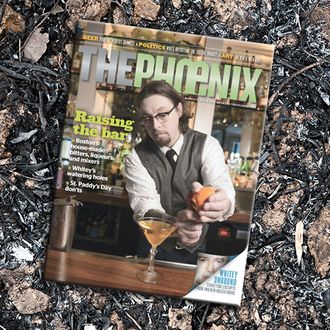
The closing of the Boston Phoenix should hit me hard ÔÇö it was my first professional gig as a film (and theater) critic, and I stayed nearly three years in the early eighties, before decamping for the Village Voice. I was thrilled every minute of my time there. No hyperbole: every minute. Naively or not, I felt it was everything IÔÇÖd ever dreamed of in a place of work ÔÇöloose, quirky, but with a sense of mission. A mandate to be smarter, more idiosyncratic, fearless.┬áBut I havenÔÇÖt read it in years, even though it┬á continued to publish many gifted writers. I think I stopped because it didnÔÇÖt seem ÔÇ£specialÔÇØ anymore, because alternative journalism doesnÔÇÖt mean what it did back then. Most journalism ÔÇö almost everything on the Internet ÔÇö is ÔÇ£alternative.ÔÇØ We won, and the Phoenix, I guess, finally lost.
As┬áBoston After Dark, it rode in on the counterculture, when the┬áTimes┬áwas the ÔÇ£Gray LadyÔÇØ and the Boston┬áGlobe┬áoften viewed (perhaps unjustly) as a repository of conventional wisdom. You could write long in the┬áPhoenix. You could write ÔÇ£fuckÔÇØ in the┬áPhoenix. You could make fun of the┬áGlobe┬áand the┬áTimes. The enterprise, admittedly, was hardly pure. It had been taken over by a former writer named Stephen Mindich ÔÇö at which point many of the original staff quit and set up a rival publication called┬áThe Real Paper. That story was colorfully fictionalized in Joan Micklin SilverÔÇÖs film┬áBetween the Lines, which I saw in the theater three times┬áwhile writing for the┬áHarvard Crimson ÔÇö then also imbued with a lefty-counterculture spirit┬áand a lot of roguish individualists. I loved the onscreen cynicism of John HeardÔÇÖs investigative reporter and the flakiness of Jeff Goldblum as the celebrity rock critic and the cast that included Lindsay Crouse, Jill Eikenberry, and Bruno Kirby.
But I didnÔÇÖt get a job at┬áThe Real Paper. It was the┬áPhoenix┬áthat was looking for a third-string theater critic and later a fourth-string film critic. I made $35 a review. I was in heaven.
The lowly freelancers had little contact with Mindich, who once told an editor who complimented his sweater that it ÔÇ£cost more than you make in a week.ÔÇØ Mindich also worked diligently and successfully to keep the writers from unionizing. There were rumors ÔÇö never proven ÔÇö that he helped drive┬áThe Real Paper┬áout of business. But he let us all write what we wanted, for which I am still grateful.
There wasnÔÇÖt a single hack at the┬áPhoenix┬áwhen I was there ÔÇö no one who didnÔÇÖt care deeply about his or her prose. My first editors, Carolyn Clay (theater) and Stephen Schiff (film) still rank among the best IÔÇÖve ever had. The┬áPhoenix┬á(and┬áReal Paper) had been a place for critics like Janet Maslin and David Denby and Jon Landau to shine. Lloyd Schwartz was and is brilliant on classical music. Charlie Pierce ÔÇö now a superlative political blogger for┬áEsquire ÔÇö was there, along with writers I deeply admire such as Gail Caldwell, Caroline Knapp, Laura Jacobs, Michael Sragow, Scott Rosenberg, Josh Kornbluth. IÔÇÖm forgetting many others, but not my colleague on the film desk, Owen Gleiberman, who was among the most generous and convivial IÔÇÖve ever known. WeÔÇÖd go out and see movies and come back breathlessly to report. The people at the top of the masthead werenÔÇÖt friendly, but we ÔÇö or at least I ÔÇö didnÔÇÖt need them because the┬áPhoenix┬álet me find my own voice. I could try anything and see if it would fly. Ads ÔÇö including Personals ÔÇö paid for a lot of what we did, but for the most part the writers didnÔÇÖt have to deal with that side. (For the most part: a rapacious theater-chain poobah now and then made his feelings known.)┬áAlthough I write now for a mainstream magazine, I think IÔÇÖm still an ÔÇ£alternativeÔÇØ journalist ÔÇö largely thanks to the spirit of the┬áPhoenix┬áand the memory of people whose work I still cherish.
When a few years back the┬áVoice┬áwas bought out by the┬áNew Times┬ásyndicate and began shedding long-time writers and editors it sent a message to the world. You couldnÔÇÖt do what you wanted to do in ÔÇ£alternativeÔÇØ journalism anymore. You had to behave. Sure, it made for less self-indulgence (and shorter pieces). But it made ÔÇö ironically ÔÇö alternative journalism seem less alternative than blogs, in which writers could think of themselves as cult figures and often be correct rather than grandiose. Without that sense of danger ÔÇö and at a time when readers donÔÇÖt need Personals or listings in print form ÔÇö the┬áBoston Phoenix┬ádidnÔÇÖt have a reason for being.
No, thatÔÇÖs wrong. Good writing and reporting is always its own reason for being. Its being just didnÔÇÖt have the same urgency. It wasnÔÇÖt what I remember ÔÇö and no doubt romanticize: a beacon.
This post has been revised since first publication.


